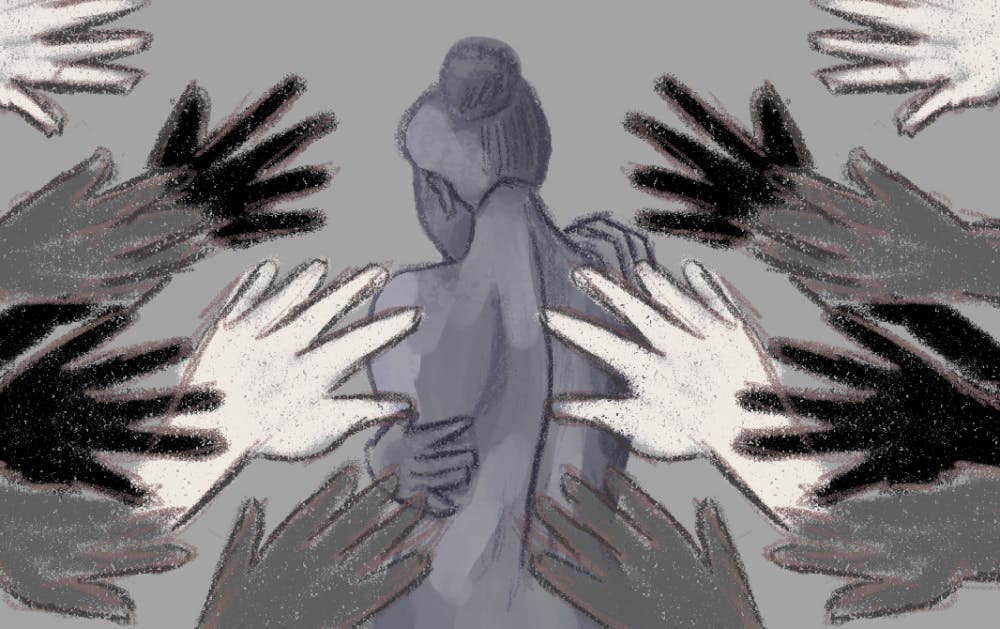Whether it's a friend, co-worker or stranger, sexual assault can happen anywhere — and experts say bar and drinking culture can aggravate the problem.
A statewide program called Arizona Safer Bars Alliance (ASBA), or "Safer Bars," hopes to shrink the number of sexual assault incidents that take place at liquor serving establishments within a one-mile radius of college campuses.
The program will train bar staff how to recognize potential sexual assault incidents and how to intervene in the situation, according to Kelly Davis, a researcher involved with the study and associate professor at the College of Nursing and Health Innovation.
The $3 million grant from the National Institutes of Health will evaluate bar staff training effectiveness in Tucson, Tempe and Flagstaff according to Davis.
In order to provide bar staff members with the knowledge and support that is needed to intervene, Davis said the program will teach the staff how to recognize when someone is engaging in flirtatious behavior versus unwanted sexual activity.
"We'll be able to teach staff not only how to recognize when these situations are happening but also to feel like they ... have the knowledge, ability and support from other bar staff," Davis said.
According to Davis, about half of sexual violence cases include alcohol consumption on the part of the perpetrator, whether it is at a party or an establishment serving alcohol.
Davis said bar staff will have to agree to the training at their site and for researchers to come in to be apart of the study.
Davis said having bar staff aware of the warning signs is critical, as they are sober and more cognizant of the environment.
Elise Lopez, a UA researcher involved with the study, assistant director for the Relationship Violence Program and assistant professor of practice, said she hopes that the study will contribute to making college experiences safer.
"We know that students tend to be at high risk of binge drinking behavior and risky sexual behavior," said Lopez. "When we have all of that in a space that is highly sexualized and there is a lot of alcohol availability, it's a perfect storm for sexual aggression."
Lopez said bars in Old Town Scottsdale will also be evaluated as it is also a hotspot for ASU students.
Bar staff training will be free to any bar that wants it, and there will be a free refresher training every year even after the grant is over in 2023, according to Lopez.
Davis said she wants the results of the study to be used by other states as a resource guide because there are a lot of people around the country who are interested in sexual assault prevention in bar settings.
"Part of our thinking is around practical application," said Lopez. "How do we make sure, if our program is successful, that we are able to help other people use it?"
"Safer Bars" started back in 2012 through funding from the U.S. Centers for Disease Control and Prevention, but UA was contacted to refine the program and they have been working with the Arizona Department of Health Services for five years now to evaluate the program, according to Lopez.
Lopez said they are aiming to have the outreach process begin in November.
Lindsay Ashworth, a sexual violence response manager at the Arizona Coalition to End Sexual and Domestic Violence, will be assisting in recruiting bars for the study.
Ashworth said the recruitment of bars will be done through emailing, cold-calling and visiting the bars in person.
"Our outreach strategy is to focus on the bars that the study is targeting," said Ashworth.
Ashworth recruited bars in the past for the "Safer Bars" program outside of a university setting and said the biggest struggle during the recruitment process was compensating bars for their time.
"The number one barrier has been paying staff for their time because we haven't had any opportunity to compensate," said Ashworth.
Those involved in the study can't overstate the importance of encouraging safe environments for college students.
"Our hope is that these bars can become safer drinking spaces for students, where if something is happening, students will know that bar staff has their back and are there to keep them safe," Lopez said.
Reach the reporter at mfsadegh@asu.edu and follow @SadeghiMckenzie on Twitter.
Like The State Press on Facebook and follow @statepress on Twitter.




